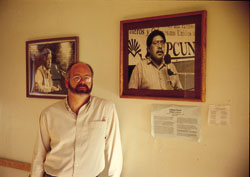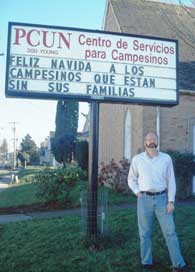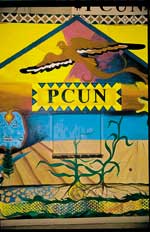 |
|
|||||
|
Eight-year-old Librado Sanchez sits in the middle of the room, a few feet from a television perched atop a dresser which his mother, aunt, and younger sister have been watching. He's hunched over a table, carefully tracing a Pokemon figure from a coloring book, in the only heated room in the small, patched-up, single-story house. Barely acknowledging the entrance of his compadres (godparents) and me, he's determined to finish the drawing before shifting his focus. As he finishes, carefully putting the paper and book in a dresser drawer, I wonder if this activity isn't a kind of refuge, a self-made sanctuary from the precariousness of his family's existence here. Here, in the middle of the Willamette Valley, a broad, fertile plain between the Cascade and Coast Range mountains, is a 4,000-square-mile section of Northwest Oregon. Agriculture is a $3 billion business in Oregon; the state ranks among the top three in the production of at least 23 commodities, and harvesting is labor intensive. Librado's family is in the minority: Mexican farmworkers who stay north year 'round, even if barely able to find enough off-season work to support themselves. His parents belong to Pineros y Campesinos Unidos del Noroeste (PCUN--Northwest Treeplanters and Farmworkers United), Oregon's farmworkers union. The majority of PCUN's more than 4,500 members are seasonal, some commuting up year after year to work the fields, others only once or twice. It's part of what makes organizing this labor force difficult. It took five years, from 1980 to 1985, to establish the union. Four people were there at the beginning: Larry Kleinman '75, Cipriano Ferrel, Juan Mendoza, and Ramon Ramirez. Ferrel had the vision. Having grown up with the daughters of Cesar Chavez, who, in 1965, founded the United Farm Workers union in California, Ferrel knew first-hand the potential of organized labor. The four met through the Willamette Valley Immigration Project, an initiative that Kleinman helped start in 1977 to offer legal assistance to immigrants, particularly Latinos targeted by raids and deportation by the U.S. Immigration and Naturalization Service. "We knew we weren't going to get to the root of the problem just doing immigration work," says Kleinman. "The problem is economic. People were being exploited. And in our economy, the most effective means of addressing that is forming a union."
Oregon
farmworkers, he says, face myriad issues, including no basic
labor rights. They lack seniority, job security, protection
from retaliation and production speed ups, and the ability
to file grievances, organize, and elect representation.
As most farmworkers are paid on a piece-work basis, compensation routinely falls below minimum wage. And like most other low-wage laborers, they face a severe shortage of decent, affordable housing. The decades-old practice of housing workers in labor camps on company land adds the dimension of racial segregation and employer-control. Kleinman
says that workers must also deal with pesticides and agricultural
chemicals that are widely employed throughout the Valley.
"PCUN has been working to insure workers the right to know
which chemicals are being applied, the right to complain
about exposure to them, and to limit their use," he says.
Too, the cost of and access to adequate health care is limited,
a pressing problem given the physical demands of the industry
and routine exposure to pesticides.
Finally,
says, Kleinman, the cost and backlog of immigrant applications
has increased in recent years, keeping families to remain
apart, separated by political borders for extended periods
of time.
White, Jewish, and raised in the affluence of the Chicago suburb of Highland Park, Kleinman is an unlikely leader within a predominantly Latino organization, where "white privilege" can be criticized. "We strive to deal with it deliberately and honestly," he says. "Ultimately, it is up to the community whether or not they want me around and playing my role. I have to be a member serving the community; not a person using the community to support an agenda." He joined the Volunteers In Service To America (VISTA) program after graduating from Oberlin, and worked on housing issues as a paralegal in a Spokane Legal Aid office. The son of a lawyer, Kleinman was home-schooled in the law, explaining that "a lot of the orientation of my family was debating stuff." A year later, in 1976, he moved to the Public Defenders Office in Vancouver and observed the daily workings of the civil and criminal justice system. "I didn't have a career goal out of college. I wanted to do something that furthered my values, but what that was going to be, I really didn't know." His interest in helping the disadvantaged with their legal concerns led him to the National Lawyers Guild, dedicated to making human rights more sacred than property rights. He met Chicano activists in the Valley and helped create the Willamette Valley Immigration Project. For 11 years, Kleinman worked, investing "as little time as possible" in other jobs to earn a living. In 1988 he was elected secretary/treasurer of PCUN for the first of eight terms, and began a career of fundraising, managing finances, coordinating activist campaigns, and addressing state legislative issues that impact union members. The PCUN building is located a block from what was once the center of Woodburn, a town of 16,000 in the middle of the Willamette Valley, largely abandoned in favor of nearby strip malls. The area still serves as a center for the service and cultural activity of the largest concentration of farmworkers in the state, predominantly Mexicans, as it has since the 1950s. It was a natural home for the Willamette Valley Immigration Project and, subsequently, PCUN. The prosperity of the surrounding farms, some encompassing thousands of acres, is as dependent on the laborers as they are upon the seasonal work. Yet with a steady supply of eager and inexpensive labor, the relationship between worker and employee is often one of domination and submission. Furthermore, farmworkers fall outside of federal work protections, such as the National Labor Relations Act. Severely disadvantaged in their own country, Mexicans have been working in the Oregon fields since the early 1940s. To address an acute farmworker shortage during World War II, the U.S. government brought thousands of Mexicans north through the Bracero Program to provide American farmers with cheap and typically hard-working laborers. After the war, little changed. As Kleinman explains, "That basic paradigm is the essential ingredient of the farm labor system 50 years later." It is in the farm owners' best interest to maintain a flooded job market so that if hit by demands or a workers' strike, the laborers are fired and replacements easily found, a scenario that is often repeated in the Valley. "In 1988, no one thought a farmworkers union in Oregon was viable," says Kleinman. "The idea of collective bargaining was considered an improbable dream." PCUN has persevered and today has four contracts achieved through collective bargaining with smaller growers. Programs extend beyond labor organizing and include English citizenship classes, an initiative to stop pesticide poisoning, a media and "popular library/living archives," a women's project, the development of farmworker-controlled housing, and a service center which offers, among other resources, the immigration legal assistance previously provided by the Willamette Valley Immigration Project. Among PCUN's more visible achievements are the 102 units of low-income housing run by an independent, non-profit sister organization, the Farmworker Housing Development Corporation (FHDC). Non-descript, run-down, tucked as far from sight as possible, and overcrowded with migrant workers, most farmworker housing in the area provides the barest of accommodations. The exorbitant rent is usually deducted from wages paid by the growers or contractors who own and manage the labor camps. The arrangement is easily exploited. Last summer, at the instigation of PCUN, Occupational Safety and Health Administration stepped up its inspections of the camps, citing one owner for more than 46 violations, an incident that attracted reporters from several Portland television stations. PCUN
was instrumental in the formation of the FHDC and in securing
the funding and sites for the apartments. The two developments
comprise clean, well-kept communities and are the recipients
of several state and national design awards. Farmworkers
who occupy them have a say in the housing management.
It
would be a fallacy to view Kleinman's work in terms of an
adopted foreign struggle. Although marginalized by language,
culture, and particularly class, Librado's parents and thousands
more are part of an American system of exploitation that
has impacted immigrant communities throughout our history.
PCUN is dedicated to change, the kind of evolution that requires a long, sustained effort to achieve. Two benefits have kept him engaged. "The work has given me the opportunity to be effective and successful in an area that reflects my values. And it has taught me a tremendous amount. I look back 23 years and see that I've gained more than I've given." Kleinman's greatest accomplishment isn't the funding he's raised or the farmworker housing project, or any of the tangible accomplishments of PCUN, but simply that 15 years after its founding, PCUN has put the issue of justice for farmworkers on the map in Oregon, and everyone from the governor on down is taking notice. Representatives of the union are visiting colleges, including Oberlin, this spring to raise awareness of the workers' struggles and to mobilize support groups on campuses. Kleinman
foresees a time when collectively bargained contracts are
the norm for Oregon farmworkers, and PCUN extends its reach
to the entire state. Yet, he is cautious as well. It isn't
enough for PCUN to achieve progress. As history has shown,
labor advances can evaporate if not sustained.
For
additional information about PCUN, visit www.pcun.org
Peter
S. Nicholson is a writer and designer.
|
||||||
|
|
||||||


